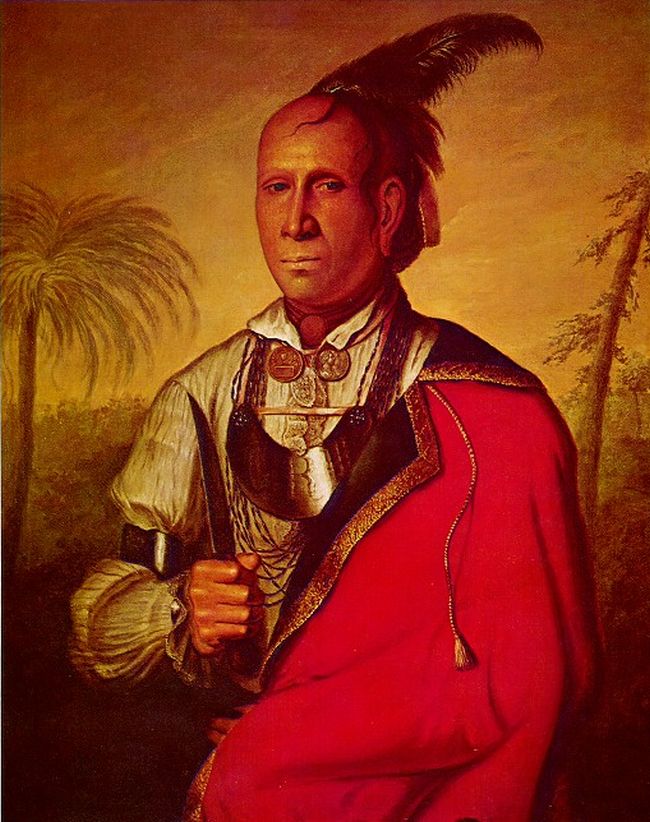|
John Brown (Cherokee Chief)
John Brown, formerly judge of the Chickamauga District of the Cherokee Nation East, was elected Principal Chief of the Cherokee Nation West 22 April 1839, after the Old Settlers decided to elect new officers to strengthen their position vis-a-vis the Latecomers under John Ross, in place of then Principal Chief John Looney. He served until a majority of the Old Settlers decided his administration had not gone far enough to accomplish a compromise with the Ross party, and re-elected his predecessor John Looney in his place that July. Brown's Tavern in Lookout Valley, Chattanooga, Tennessee, is so-named because it was once his, part of a complex of businesses that included a riverboat landing for the tavern and inn, Brown's Ferry a mile or more downstream, a large farm, and a mill. Now a private home, it is on the National Register of Historic Places The National Register of Historic Places (NRHP) is the United States federal government's official list of districts, sites, b ... [...More Info...] [...Related Items...] OR: [Wikipedia] [Google] [Baidu] |
Cherokee
The Cherokee (; chr, ᎠᏂᏴᏫᏯᎢ, translit=Aniyvwiyaʔi or Anigiduwagi, or chr, ᏣᎳᎩ, links=no, translit=Tsalagi) are one of the indigenous peoples of the Southeastern Woodlands of the United States. Prior to the 18th century, they were concentrated in their homelands, in towns along river valleys of what is now southwestern North Carolina, southeastern Tennessee, edges of western South Carolina, northern Georgia, and northeastern Alabama. The Cherokee language is part of the Iroquoian language group. In the 19th century, James Mooney, an early American ethnographer, recorded one oral tradition that told of the tribe having migrated south in ancient times from the Great Lakes region, where other Iroquoian peoples have been based. However, anthropologist Thomas R. Whyte, writing in 2007, dated the split among the peoples as occurring earlier. He believes that the origin of the proto-Iroquoian language was likely the Appalachian region, and the split betw ... [...More Info...] [...Related Items...] OR: [Wikipedia] [Google] [Baidu] |
Principal Chief Of The Cherokee Nation
Principal Chief is today the title of the chief executives of the Cherokee Nation, of the Eastern Band of Cherokee Indians, and of the United Keetoowah Band of Cherokee Indians, the three federally recognized tribes of Cherokee. In the eighteenth century, when the people were primarily organized by clans and towns, they would appoint a leader for negotiations with the Europeans. They called him ''Uku'', or "First Beloved Man". The title of "Principal Chief" was created in 1794, when the Cherokee began to formalize a more centralized political structure. They founded the original Cherokee Nation. The Cherokee Nation–East adopted a written constitution in 1827, creating a government with three branches: legislative, executive, and judicial. The Principal Chief was elected by the National Council, which was the legislature of the Nation. The Cherokee Nation–West adopted a similar constitution in 1833. In 1839 most of the reunited nation was reunited in Indian Territory, after for ... [...More Info...] [...Related Items...] OR: [Wikipedia] [Google] [Baidu] |
John Ross (Cherokee Chief)
John Ross ( chr, ᎫᏫᏍᎫᏫ, translit=guwisguwi) (October 3, 1790 – August 1, 1866), (meaning in Cherokee: "Mysterious Little White Bird"), was the Principal Chief of the Cherokee Nation from 1828 to 1866; he served longer in that position than any other person. Described as the Moses of his people, Ross influenced the nation through such tumultuous events as the relocation to Indian Territory and the American Civil War. Ross was the son of a Cherokee mother and a Scottish father. His mother and maternal grandmother were each of mixed Scots-Cherokee ancestry but brought up in Cherokee culture, which is matrilineal. His maternal grandfather was a Scottish immigrant. At the time among the matrilineal Cherokee, children born to a Cherokee mother were considered part of her family and clan; they gained their social status from their mother. The Cherokee absorbed mixed-race descendants born to its women. As a result, young John was raised to identify as Cherokee, while also lea ... [...More Info...] [...Related Items...] OR: [Wikipedia] [Google] [Baidu] |
John Looney (Cherokee Chief)
John Looney (c 1782-1846) was a Cherokee chief. As a young man, he served in the army under Andrew Jackson. He later became chief of the Western Cherokee, in which capacity he negotiated with the US government and dealt with conflicts with the rival Eastern Cherokee. Early life Looney was born about 1782 in what is now the northeastern corner of Alabama. He was said to have been three quarters Cherokee by blood and a nephew of Chief Black Fox (Enoli). The earliest record of John Looney shows that he served from October 6, 1813 until January 6, 1814 during the Creek War (War of 1812) as a corporal in Capt. George Fields Company of Col. Gideon Morgan's Regiment of Cherokee Warriors under General Andrew Jackson. John Looney fought at the Battle of Emuckfaw in January 1814 and was severely wounded by a gunshot which went through his left shoulder blade, disabling him. Later in life, Looney applied for and received a pension in recognition of his military service and disabling wound. He ... [...More Info...] [...Related Items...] OR: [Wikipedia] [Google] [Baidu] |
Chattanooga, Tennessee
Chattanooga ( ) is a city in and the county seat of Hamilton County, Tennessee, United States. Located along the Tennessee River bordering Georgia, it also extends into Marion County on its western end. With a population of 181,099 in 2020, it is Tennessee's fourth-largest city and one of the two principal cities of East Tennessee, along with Knoxville. It anchors the Chattanooga metropolitan area, Tennessee's fourth-largest metropolitan statistical area, as well as a larger three-state area that includes Southeast Tennessee, Northwest Georgia, and Northeast Alabama. Chattanooga was a crucial city during the American Civil War, due to the multiple railroads that converge there. After the war, the railroads allowed for the city to grow into one of the Southeastern United States' largest heavy industrial hubs. Today, major industry that drives the economy includes automotive, advanced manufacturing, food and beverage production, healthcare, insurance, tourism, and back office ... [...More Info...] [...Related Items...] OR: [Wikipedia] [Google] [Baidu] |
National Register Of Historic Places
The National Register of Historic Places (NRHP) is the United States federal government's official list of districts, sites, buildings, structures and objects deemed worthy of preservation for their historical significance or "great artistic value". A property listed in the National Register, or located within a National Register Historic District, may qualify for tax incentives derived from the total value of expenses incurred in preserving the property. The passage of the National Historic Preservation Act (NHPA) in 1966 established the National Register and the process for adding properties to it. Of the more than one and a half million properties on the National Register, 95,000 are listed individually. The remainder are contributing resources within historic districts. For most of its history, the National Register has been administered by the National Park Service (NPS), an agency within the U.S. Department of the Interior. Its goals are to help property owners and inte ... [...More Info...] [...Related Items...] OR: [Wikipedia] [Google] [Baidu] |
William G
William is a male given name of Germanic origin.Hanks, Hardcastle and Hodges, ''Oxford Dictionary of First Names'', Oxford University Press, 2nd edition, , p. 276. It became very popular in the English language after the Norman conquest of England in 1066,All Things William"Meaning & Origin of the Name"/ref> and remained so throughout the Middle Ages and into the modern era. It is sometimes abbreviated "Wm." Shortened familiar versions in English include Will, Wills, Willy, Willie, Bill, and Billy. A common Irish form is Liam. Scottish diminutives include Wull, Willie or Wullie (as in Oor Wullie or the play ''Douglas''). Female forms are Willa, Willemina, Wilma and Wilhelmina. Etymology William is related to the given name ''Wilhelm'' (cf. Proto-Germanic ᚹᛁᛚᛃᚨᚺᛖᛚᛗᚨᛉ, ''*Wiljahelmaz'' > German ''Wilhelm'' and Old Norse ᚢᛁᛚᛋᛅᚼᛅᛚᛘᛅᛋ, ''Vilhjálmr''). By regular sound changes, the native, inherited English form of the name shoul ... [...More Info...] [...Related Items...] OR: [Wikipedia] [Google] [Baidu] |
Principal Chiefs Of The Cherokee
Principal Chief is today the title of the chief executives of the Cherokee Nation, of the Eastern Band of Cherokee Indians, and of the United Keetoowah Band of Cherokee Indians, the three federally recognized tribes of Cherokee. In the eighteenth century, when the people were primarily organized by clans and towns, they would appoint a leader for negotiations with the Europeans. They called him ''Uku'', or "First Beloved Man". The title of "Principal Chief" was created in 1794, when the Cherokee began to formalize a more centralized political structure. They founded the original Cherokee Nation. The Cherokee Nation–East adopted a written constitution in 1827, creating a government with three branches: legislative, executive, and judicial. The Principal Chief was elected by the National Council, which was the legislature of the Nation. The Cherokee Nation–West adopted a similar constitution in 1833. In 1839 most of the reunited nation was reunited in Indian Territory, after f ... [...More Info...] [...Related Items...] OR: [Wikipedia] [Google] [Baidu] |
Year Of Birth Missing
A year or annus is the orbital period of a planetary body, for example, the Earth, moving in its orbit around the Sun. Due to the Earth's axial tilt, the course of a year sees the passing of the seasons, marked by change in weather, the hours of daylight, and, consequently, vegetation and soil fertility. In temperate and subpolar regions around the planet, four seasons are generally recognized: spring, summer, autumn and winter. In tropical and subtropical regions, several geographical sectors do not present defined seasons; but in the seasonal tropics, the annual wet and dry seasons are recognized and tracked. A calendar year is an approximation of the number of days of the Earth's orbital period, as counted in a given calendar. The Gregorian calendar, or modern calendar, presents its calendar year to be either a common year of 365 days or a leap year of 366 days, as do the Julian calendars. For the Gregorian calendar, the average length of the calendar year (the mea ... [...More Info...] [...Related Items...] OR: [Wikipedia] [Google] [Baidu] |
Year Of Death Missing
A year or annus is the orbital period of a planetary body, for example, the Earth, moving in its orbit around the Sun. Due to the Earth's axial tilt, the course of a year sees the passing of the seasons, marked by change in weather, the hours of daylight, and, consequently, vegetation and soil fertility. In temperate and subpolar regions around the planet, four seasons are generally recognized: spring, summer, autumn and winter. In tropical and subtropical regions, several geographical sectors do not present defined seasons; but in the seasonal tropics, the annual wet and dry seasons are recognized and tracked. A calendar year is an approximation of the number of days of the Earth's orbital period, as counted in a given calendar. The Gregorian calendar, or modern calendar, presents its calendar year to be either a common year of 365 days or a leap year of 366 days, as do the Julian calendars. For the Gregorian calendar, the average length of the calendar year (the me ... [...More Info...] [...Related Items...] OR: [Wikipedia] [Google] [Baidu] |





